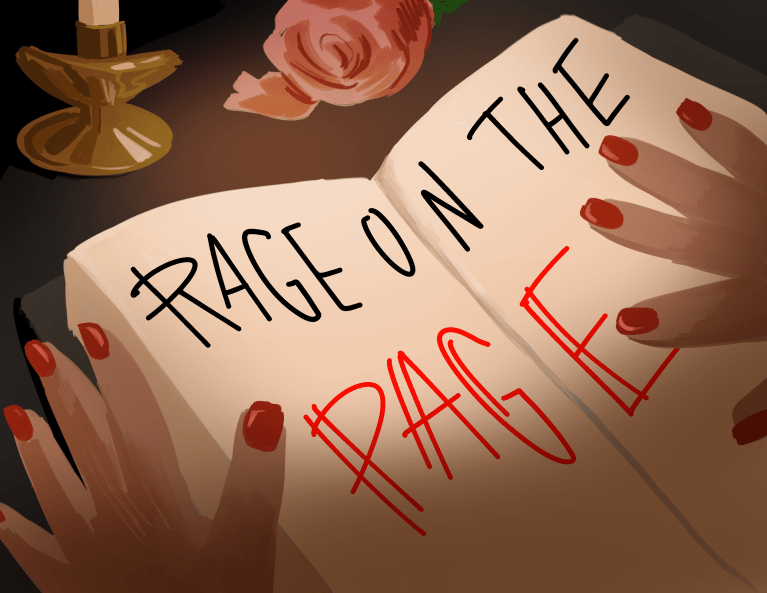In her column “Rage on the Page,” Melisa Guleryuz ’27 reviews books about anger in women’s literature.
“Nightbitch” by Rachel Yoder does not deliver your typical “motherhood is so rewarding” novel. Instead, Yoder serves up a steaming story that answers the question, “What happens when a mom is fed up?”
The answer Yoder gives: she turns into a dog.
Yes, the mother turns into a literal dog — fangs, fur and all — and it’s every bit as wild as it sounds. I loved the exploration of how women can be raw and primal despite society’s attempts at confining them into their own definition of “femininity.”
Yoder is not just playing with absurdity here. She is digging deep into the primal, repressed rage of women who are constantly asked to sacrifice their dreams for their children. “Nightbitch” howls at a society that glorifies selflessness and sneers at ambition — and it does so with biting humor, surreal moments and a feminist edge sharp enough to cut glass.
The 2021 novel follows an unnamed protagonist who is a former artist turned stay-at-home mom. She’s spent far too many days lost in the monotony of parenthood, from wiping noses to making endless snacks, to stepping on plenty of painful Legos.
It’s a familiar scene for so many women, but Yoder takes it up a notch. What happens when domestic imprisonment makes you feel more animal than human? This idea is shown right when our protagonist starts noticing changes. Her teeth feel sharp. New hair sprouts in new places. She develops an irresistible urge to run wild, to howl at the moon.
This transformation isn’t just physical. It’s deeply psychological and culminates in a mental breaking point. The woman sees the truth of her existence, who she actually is beneath the roles thrown her way.
The protagonist ponders, “How many generations of women had delayed their greatness only to have time extinguish it completely?” This question forces readers to reckon with the centuries of sidelined brilliance among women. Women have been told to wait, to be patient, to prioritize everyone else. Meanwhile, the men have the luxury of time to burn. The deliberation that comes with this book is both infuriating and enriching, allowing the reader to adopt a broader perspective.
Yoder turns quiet anger into a flame, scorching the very idea of self-sacrifice. “And what a mean trick to call such things holy or selfless. How evil to praise women for giving up each and every dream.” The protagonist’s verbal bite makes her sacrifice hit in a liberating way through unconstrained speech.
“Nightbitch” is not cutesy or quirky. It’s about reclaiming the parts of yourself that the world has told you to suppress. The protagonist’s transformation is not just about rage — it is about becoming her true self. Her evolution comes with a radical realization: “insist on your joy.” Joy is not something you ask for, it’s something you demand.
The protagonist’s joy is not the only thing at stake — our social constructions of motherhood are similarly in jeopardy. Motherhood doesn’t and can’t magically fix everything in one’s life. In fact, sometimes it does the opposite.
The protagonist says, “I am interested in a profound longing for an unknown existence, or for a better life, without any idea of what the specifics of that life would look like.” Yoder reveals that longing for something beyond can be disastrous and undefined, teaching its readers that there’s more to womanhood and motherhood than cleaning up messes.
The author also captures connections between women in a way that feels both ancient and urgent. “This must be what it means to be an animal, to look at another and say, I am so much that other thing that we are part of one another. Here is my skin. Here yours. Beneath the moon, we pile inside the warm cave, becoming one creature to save our warmth. We breathe together and dream together.”
Yoder taps into this sisterhood of survival, suggesting that women have always relied on each other and kept each other alive through their collective warmth. In a world that wants to divide women, there is strength in coming together.
Ultimately, the protagonist’s transformation into a dog is her way to reclaim her lost dreams, her wildness, her untapped potential. She’s done with the praise, the fake pats on the back for being a “selfless” mother. She wants to bite back, to show her teeth and to claim what’s hers.
“Nightbitch” is a feminist anthem disguised as a bizarre and brilliant tale of metamorphosis. Yoder gives us a protagonist who refuses to be tamed, who embraces the animal within to rediscover her joy, power and freedom. The novel serves as a call for women everywhere to let out the wildness that we’ve been taught to suppress for far too long.
Maybe we don’t all have to grow fur and fangs, but we can start insisting on our joy. “Nightbitch” reminds us, in a world that wants to praise us for giving up our dreams, the most radical thing we can do is refuse to let go of them.
Editor’s Note: This article is a review and includes subjective thoughts, opinions and critiques.
